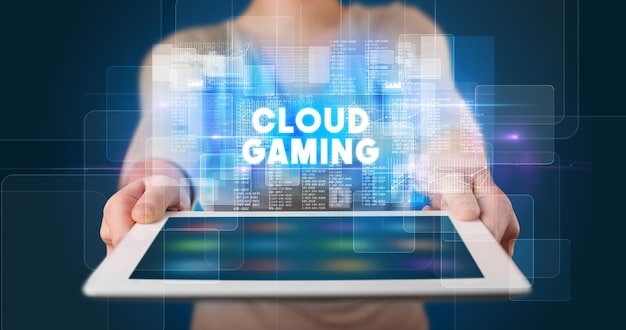The Future of PC Gaming: Cloud vs. Local Hardware in 2025

The Future of PC Gaming: Cloud Streaming vs. Local Hardware in 2025 explores the evolving landscape of gaming technology, comparing the benefits and drawbacks of cloud-based gaming services against traditional local hardware setups to predict which model will dominate in the coming years.
As technology advances exponentially, the question on every gamer’s mind is: what does the future hold for PC gaming? Will the future of PC Gaming: Cloud Streaming vs. Local Hardware in 2025 be dominated by the convenience of cloud services, or will the raw power of local hardware continue to reign supreme?
The Rise of Cloud Gaming Services
Cloud gaming has emerged as a viable alternative to traditional PC gaming, promising access to high-end games on virtually any device with a stable internet connection. This technology eliminates the need for expensive hardware upgrades, making gaming more accessible to a wider audience.
Several services have already made significant strides in the cloud gaming market. But what are the key advantages that cloud gaming offers?
Advantages of Cloud Gaming
Cloud gaming offers several appealing advantages, primarily centered around accessibility and cost savings. These benefits are particularly attractive to casual gamers or those who don’t want to invest heavily in hardware.
- Accessibility: Play games on almost any device, including smartphones, tablets, and low-end laptops.
- No Hardware Upgrades: Eliminate the need to constantly upgrade expensive PC components like GPUs and CPUs.
- Cost Savings: Potentially lower upfront costs as you subscribe to a service rather than buying individual games and hardware.
- Instant Access: Start playing games immediately without waiting for downloads or installations.

Cloud gaming represents a paradigm shift in how games are consumed and accessed. It democratizes gaming by removing the barrier of entry associated with costly hardware. But does it have what it takes to be the future of PC gaming?
The Enduring Appeal of Local Hardware
Despite the rise of cloud gaming, local hardware retains a strong appeal for many PC gamers. The ability to customize, optimize, and control every aspect of their gaming experience is a significant draw.
Local hardware setups offer unparalleled performance and visual fidelity, ensuring the best possible gaming experience. What are the principal reasons this remains the top choice for dedicated players?
Benefits of Local Hardware
Local hardware provides several key advantages, particularly for enthusiasts who demand the highest levels of performance and customization. These benefits are crucial for competitive and visually demanding games.
- Superior Performance: Enjoy higher frame rates, better graphics settings, and lower latency compared to cloud gaming.
- Customization: Tailor your PC to your specific needs with a wide range of hardware options and configurations.
- Offline Play: Play games without an internet connection, which is essential for many gamers.
- Ownership: Own your games and hardware, providing a sense of control and permanence.
The tactile experience of building and upgrading a PC is also a significant aspect of the local hardware appeal, creating a sense of ownership and pride. It’s an investment in your fun.
Technological Advancements Shaping the Future
Several technological advancements are poised to shape the future of both cloud gaming and local hardware. These innovations will likely determine which model ultimately prevails.
Advancements in areas such as network infrastructure, hardware performance, and streaming technologies will have a profound impact on the gaming landscape. What specific technologies are driving these changes?
Key Technological Drivers
Technological advancements in both hardware and software are pushing the boundaries of what’s possible in gaming. These innovations will continue to improve the performance and accessibility of both local and cloud gaming solutions.
- 5G and Improved Internet Infrastructure: Faster and more reliable internet connections are essential for cloud gaming to deliver a smooth and responsive experience.
- Next-Gen GPUs and CPUs: New hardware from companies like Nvidia and AMD will continue to push the boundaries of graphics and processing power, enhancing both local and cloud gaming.
- Advanced Streaming Technologies: Improvements in streaming technologies, such as better compression algorithms and reduced latency, will make cloud gaming more competitive.
- Ray Tracing and AI Upscaling: Technologies like ray tracing and AI upscaling enhance visual fidelity and performance, benefiting both local and cloud gaming.

These technological advancements are paving the way for an exciting future in PC gaming, where both cloud and local hardware solutions continue to evolve and improve. As technology progresses, both will offer uniquely compelling experiences to gamers.
Economic Factors and Market Trends
Economic factors and market trends play a crucial role in shaping the future of PC gaming. The pricing models of cloud gaming services and the affordability of local hardware are key considerations for consumers.
The overall economic climate, competition among providers, and consumer spending habits will influence the growth and adoption of both cloud gaming and local hardware. What are other factors at play here?
Economic Considerations
Economic factors significantly influence the choices gamers make when deciding between cloud gaming and local hardware. The overall cost of each option, including subscriptions, hardware upgrades, and game purchases, is a key consideration.
- Subscription Costs: The monthly or annual cost of cloud gaming services can add up over time, potentially exceeding the cost of owning games and hardware.
- Hardware Prices: The cost of high-end PC components, such as GPUs and CPUs, can be a significant barrier to entry for many gamers.
- Game Pricing: The cost of purchasing individual games can vary significantly between cloud gaming services and local platforms like Steam or the Epic Games Store.
- Value Proposition: Gamers must weigh the cost benefits of each option against the performance and features they prioritize.
Ultimately, the perceived value proposition of each option will determine which one gains more traction in the market. As consumer preferences shift, companies will adapt to meet those demands.
Gaming Communities and Ecosystems
Gaming communities and ecosystems play a vital role in shaping the preferences and habits of PC gamers. The social aspect of gaming, including online multiplayer, streaming, and esports, significantly influences purchasing decisions.
Different communities have different needs and preferences, and each type of gamer has its own unique set of priorities. Are these communities and ecosystems mutually exclusive?
The Influence of Gaming Communities
Gaming communities and ecosystems significantly impact the choices gamers make when deciding between cloud gaming and local hardware. The sense of belonging, shared experiences, and social connections within these communities can influence purchasing decisions and gameplay habits.
- Competitive Gaming: Competitive gamers often prefer local hardware for its superior performance and lower latency, which are essential for success in online multiplayer games.
- Modding Communities: Modding communities thrive on local hardware, as they require the ability to access and modify game files, which is not always possible with cloud gaming services.
- Streaming and Content Creation: Content creators often prefer local hardware for its flexibility and customization options, allowing them to optimize their setups for streaming and video editing.
The diverse needs and preferences of gaming communities will likely lead to a coexistence of both cloud gaming and local hardware in the future. Both options have their place in the industry and continue to do so.
Predicting the Dominant Model in 2025
Predicting the dominant model in 2025 requires considering all the factors discussed above, including technological advancements, economic trends, and the influence of gaming communities. While it’s impossible to predict the future with certainty, we can make informed predictions based on current trends.
The landscape of PC gaming is evolving rapidly, and the outcome will depend on how these factors converge and interact. What are the short-term forecasts?
Forecasts for 2025
By 2025, it’s likely that both cloud gaming and local hardware will coexist, catering to different segments of the PC gaming market. However, several key trends suggest that local hardware will retain its dominance, particularly among hardcore gamers and enthusiasts.
- Continued Hardware Innovation: Ongoing advancements in CPU, GPU, and storage technology will continue to drive the performance of local hardware, making it an attractive option for gamers seeking the best possible experience.
- Evolving Subscription Models: As the prices of cloud gaming services rise, the ownership aspect of local hardware and traditionally purchased games seems more appealing.
- Persistent Latency Issues: Even with improvements in internet infrastructure, latency will likely remain a barrier for cloud gaming, particularly in competitive scenarios demanding lightning-fast reactions.
Local hardware and cloud gaming options will continue to improve, offering gamers more choice and flexibility. It is certain that each has carved its place in the industry.
| Key Aspect | Brief Description |
|---|---|
| 🚀 Cloud Gaming | Offers accessibility on various devices, eliminating hardware upgrades. |
| 💻 Local Hardware | Provides superior performance, customization, and offline play. |
| 🌐 Technology | 5G, advanced GPUs/CPUs, and streaming tech are improving both options. |
| 💰 Economic Factors | Costs of subscriptions vs. hardware influence gamer choices. |
Frequently Asked Questions
Cloud gaming offers accessibility across multiple devices, eliminates the need for expensive hardware upgrades, and provides instant access to games without lengthy downloads or installations. This makes it ideal for casual gamers.
Local hardware offers superior performance, allowing for higher frame rates and better graphics settings. It also provides greater customization options and the ability to play games offline, which is essential for some gamers.
5G technology enhances cloud gaming by providing faster and more reliable internet connections. This reduces latency and improves the overall streaming experience, making cloud gaming more competitive with local hardware.
Drawbacks include reliance on a stable internet connection, potential latency issues, and the ongoing cost of subscription fees. Additionally, gamers don’t own the games and are limited by the service’s game library.
Subscription costs for cloud gaming services can accumulate over time, potentially surpassing the cost of owning hardware and games. Hardware prices also play a role, as high-end PC components can be a significant upfront investment for gamers.
Conclusion
In conclusion, the future of PC Gaming: Cloud Streaming vs. Local Hardware in 2025 will likely see a coexistence of both models, each catering to different segments of the market. While cloud gaming offers convenience and accessibility, local hardware retains its appeal for those seeking peak performance and customization. The ultimate choice will depend on individual preferences, economic considerations, and the evolving capabilities of gaming technology.





